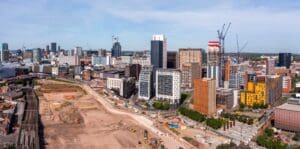Rachel Reeves is expected to halt spending on major new rail projects until after the next general election, leaving Britain’s train network under pressure from a squeeze on the public finances.
Senior industry figures say three projects already under construction are set to consume almost all available Department for Transport (DfT) funding between now and the end of the decade: the first phase of High Speed 2 (HS2) from London to Birmingham; multi-billion-pound upgrades to TransPennine infrastructure; and East West Rail, a new route connecting Oxford, Milton Keynes, Bedford and Cambridge.
Beyond these schemes, sources suggest that rail spending will be largely restricted to safety-critical maintenance unless the DfT can persuade the Treasury to bring in private investment. The future of other major rail upgrades hangs in the balance.
The revelations emerge as Transport Secretary Heidi Alexander prepares to say on Monday that public ownership of railways is “not a silver bullet” for improved performance. She will pledge to focus “relentlessly on passengers” by unveiling a new app with a “best price guarantee” ensuring travellers always secure the lowest fare, alongside further trials of tap-in-and-out “pay as you go” services. Station performance league tables will also be published in a bid to “rebuild passenger confidence one punctual, comfortable journey at a time”.
Alexander is expected to point to the poor performance of some publicly run lines, such as Northern, as evidence that state ownership alone will not solve the railways’ longstanding issues. However, she will emphasise the government’s commitment to a new public body, Great British Railways, describing it as “second in size and importance only to the NHS”. Greater integration of the rail network will be “non-negotiable”, ensuring passengers can transfer between services with minimal hassle.
Despite the focus on operators, the concern among industry insiders centres on how new rail lines and major upgrades might fare. Under Rishi Sunak’s “Network North” programme, road and rail projects intended to reallocate the £36 billion budget originally earmarked for the axed HS2 extension to Manchester are reportedly facing major delays or cancellation.
Network North promised new schemes such as a Midlands rail hub and electrification of lines in north Wales. Any postponements here could cause friction in cabinet, after Welsh Secretary Jo Stevens declared rail her “number one priority” in Reeves’ spending review.
However, Reeves may have even less room for manoeuvre than expected. Sluggish UK economic growth could leave the chancellor facing a £30 billion shortfall if the government bases spending on updated rather than official forecasts, according to reports.
Insiders stress that not all transport upgrades will be abandoned. Sir John Armitt, who chairs the National Infrastructure Commission, is drawing up a ten-year infrastructure plan to be revealed alongside Reeves’s spring forecast. This strategy will outline day-to-day government spending over at least three years and map out capital budgets for five years.
Armitt recently hinted that the government’s approach to infrastructure investment could pivot more towards roads, noting that the decarbonisation of vehicles means “the traditional argument that rail is less polluting than roads will not apply in future.” He told MPs he does not expect “significant growth in rail” and that roads will remain critical.
Responding to industry concerns, a government spokesman pointed to the autumn budget, where ministers pledged to “kick-start economic growth” by pressing on with projects including HS2, TransPennine upgrades and East West Rail. Officials denied claims that future rail schemes could be mothballed, maintaining that they remain “committed to delivering the infrastructure this country needs”. A Treasury source added that final decisions would not be taken until the spending review, where “every single pound of taxpayer’s money” would be scrutinised.
Within Whitehall, there is still a possibility of attracting private funds for new rail ventures. One option under consideration is to sell off stations built for East West Rail, allowing private investors to charge train operators or the state for their use. Similar structures already exist: Heathrow airport levies fees on rail companies for using its station, while the high-speed link between London St Pancras and Folkestone is owned by private investors who receive “access charges” from Eurostar and Southeastern.
Industry figures acknowledge such sales might raise “hundreds of millions of pounds” but would not alone elevate Britain’s network to the standards seen elsewhere in Europe. Just 39 per cent of UK lines are electrified compared with 65 per cent in Italy, 63 per cent in Spain and 60 per cent in Germany. Network Rail’s 2020 plans to electrify Britain’s railways at a cost of £30 billion were shelved by the Treasury, underscoring the fiscal challenges ahead.
Read more:
Spending freeze to push major railway projects into the sidings past general election

